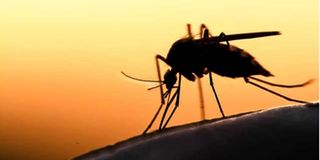Lethal mosquito spread worries health experts

A mosquito sucking blood. A deadly Asian mosquito variety has reportedly been detected in Kenya.
A deadly Asian mosquito that has alarmed experts is yet to be reported in Kenya even as the World Health Organisation (WHO) launched an initiative to stop its spread across Africa.
However, even as the international health agency works out strategies, Kenya is also on the lookout in case of any reported cases of the mosquito that is usually found in Asia.
The mosquito, scientifically identified as Anopheles stephensi, has been reported in many African countries including Nigeria, Ethiopia, Somalia, Sudan and Djibouti and it prefers urban areas.
“This is definitely going to cause a significant threat to the control and elimination of malaria in the region, given that a majority of people live in the urban setup,” the WHO said.
People in urban areas tend to have minimal exposure to malaria, making them more susceptible to the disease.
Unlike other mosquitoes in Africa caused by Anopheles gambiae species with populations rising and falling with the rainy seasons, Anopheles stephensi mosquitoes transmit malaria throughout the year.
It indicated that the species is a threat to malaria control and elimination, particularly in Africa, where the disease hits hardest.
According to the WHO, the species is said to be resistant to several classes of insecticides traditionally used to treat bed nets and home environments, has the propensity to bite both indoors and outdoors and feeds on both animal and human blood.
Poor garbage disposal, coupled with disruption in pipe-borne water supply, facilitates the breeding of the mosquito. Its larvae thrive in man-made water tanks, poorly discarded plastic containers, wells and fresh pools of water.
Containment of this new biological threat will require extensive research on spread and transmission patterns, composition, dynamics, distribution and behaviour in its new context.
“If we use the same strategies that we have been using then we won’t be successful in targeting this mosquito, we need to be innovative,” said Dr Willis Akhwale, a senior advisor at the African leaders Malaria Alliance.
Dr Akhwale said that the invasive insect poses a threat to all the initiatives including malaria vaccines launched recently and this is a sign that Africa may go back to the drawing board.
“We are doing all we can to ensure that it is stopped and countries that have not reported cases not to because we may be hit and might get out of it,” Dr Akhwale said.
Africa is the home to more than 95 percent of malaria-related deaths which claimed over 627,000 people in 2020 and sickened 241 million, mainly children under five in Africa.
“We are still learning about the presence of Anopheles stephensi and its role in malaria transmission in Africa,” said Dr Jan Kolaczinski, who leads the Vector Control and Insecticide Resistance unit with the WHO Global Malaria Programme.
The WHO said in a statement that if nothing is done, the species will put more than 126 million people in 44 cities at risk of malaria.
In Kenya, malaria is a significant public health issue. Approximately 75 percent of Kenyans are at risk for malaria because of altitude, rainfall patterns, and temperature.
Malaria has been one of the biggest scourges on humanity for millennia and it mostly kills babies and infants.





